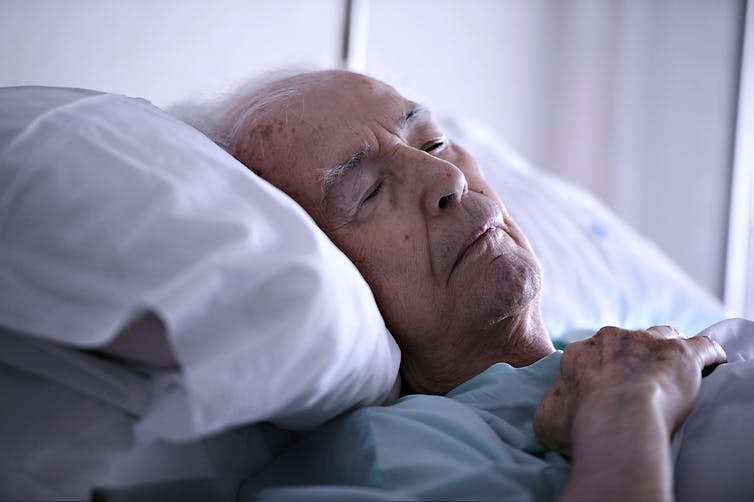Only 25% of older Australians have an advance care plan. Coronavirus makes it even more important
- Written by Craig Sinclair, Research Fellow, UNSW
Older adults and those with chronic health conditions share an increased risk of experiencing severe symptoms if they contract COVID-19.
But they’re not a homogeneous group. In the event they become very sick, one person may want all available treatment, even if this includes intensive care and an extended period of rehabilitation. Another may prefer to avoid life-sustaining but highly invasive medical interventions.
If either of these people became suddenly unwell, how likely is it health professionals would know their wishes? Understanding a person’s wishes in advance makes it easier for the health-care system to provide care that matches the person’s preferences.
Yet research shows only 25% of older Australian adults accessing health and aged-care facilities have documented their wishes for future care through advance care planning.
What is advance care planning?
Advance care planning is about discussing your goals for future care, in case of a time when you’re unable to communicate or make your own decisions. It works best when it includes health professionals, family members and other significant people (for example, a spiritual advisor).
A competent adult can specify their preferences for future health care in an advance care directive, or nominate a substitute decision-maker to make health-care decisions on their behalf.
The goal is even if a person is too unwell to make decisions, health-care professionals can still respect their preferences.
Why is advance care planning important during COVID-19?
In a recent paper, my colleagues and I make the case for incorporating advance care planning into the COVID-19 response.
First, it allows us to better prepare for any unexpected surges and reduce the need for rationing of medical resources in this event.
The recent outbreak of COVID-19 in Victoria has severely impacted aged-care settings and the broader community, and reignited concerns about the health-care system’s capacity to cope with local outbreaks.
 Three-quarters of older Australians don’t have an advance care plan.
Shitterstock
Three-quarters of older Australians don’t have an advance care plan.
Shitterstock
Much debate about ethical decision-making has focused on the “rationing” scenario, in which outbreaks overwhelm health-care resources and some people are refused treatment.
However, we shouldn’t put our ethics hat on only when the truck gets close to the cliff. Ethics and evidence should inform all decision-making in the COVID-19 response, including taking all sensible steps to avoid a rationing scenario.
If future surges in demand push health-care systems beyond capacity, it will be too late to have advance care planning discussions with people at the time of their admission to hospital.
The public health response to prevent and control outbreaks is of course crucial. Beyond this, advance care planning can ensure those who wish to refuse certain treatments have communicated this, and are not inadvertently “competing” with others for scarce health-care resources.
This is not about abandoning people or an excuse to provide less care. Advance care planning must always be a voluntary process, aimed at respecting a person’s informed preferences.
Read more: Does anyone know what your wishes are if you're sick and dying from coronavirus?
Importantly, routine care delivery is more complicated in the COVID-19 context, and respecting a person’s preferences can require preparation. For example, a person’s wish to receive care at home may depend on supplies of consumables and personal protective equipment, visiting rosters and backups in case family members or care staff need to quarantine.
Finally, it’s a matter of respecting human rights. Advance care planning enables a person to exercise some level of control over their care, even while highly dependent.
How can we boost the uptake of advance care planning?
In terms of policy, the Australian health sector’s emergency response plan for COVID-19 does indicate aged-care providers should encourage advance care planning among residents.
But the plan should be updated to incorporate a more strategic approach to increasing advance care planning across primary care, hospital and community settings — not just aged care.
 Health professionals should discuss advance care planning with their patients.
Shutterstock
Health professionals should discuss advance care planning with their patients.
Shutterstock
Health professionals, including primary care, allied health and aged-care workers, can all help patients and family members understand their condition and options for future treatment, and encourage further discussion about advance care planning.
Lawyers, trained community volunteers, health promotion units and mass media strategies can also play a role in encouraging the broader community to discuss their wishes with family members and health professionals, in non-acute community settings.
Read more: In Victoria, whether you get an ICU bed could depend on the hospital
The COVID-19 pandemic has stimulated changes in attitudes and accepted practices across the board. We should leverage this to promote increased uptake of advance care planning.
Notably, telehealth technology enables advance care planning discussions from a distance, and new legislation in some states allows remote witnessing of legal documents.
While these discussions may be most pressing for older people and those with chronic conditions, we can all access relevant resources and start talking with family members and health professionals about our wishes.
Authors: Craig Sinclair, Research Fellow, UNSW





